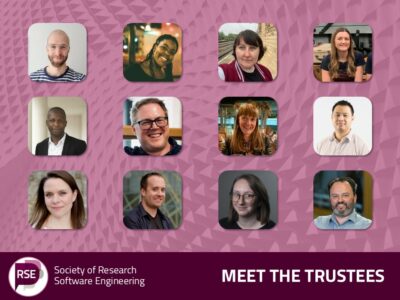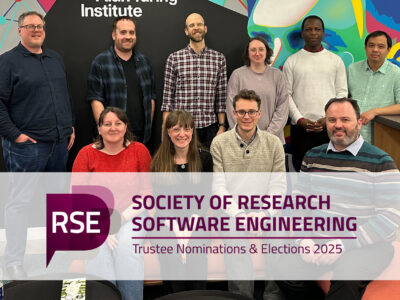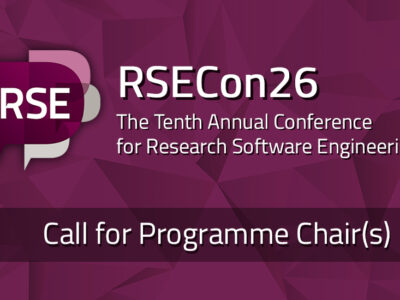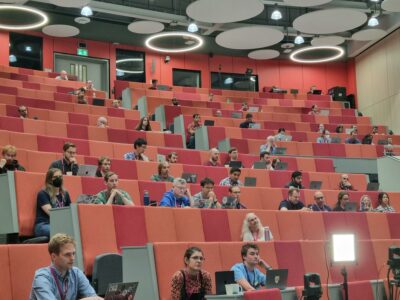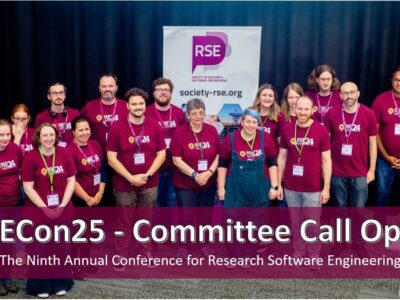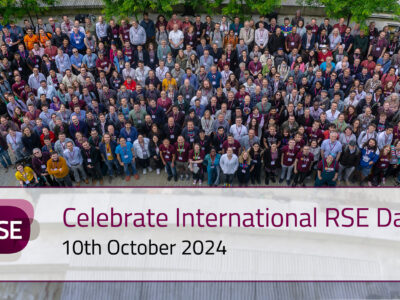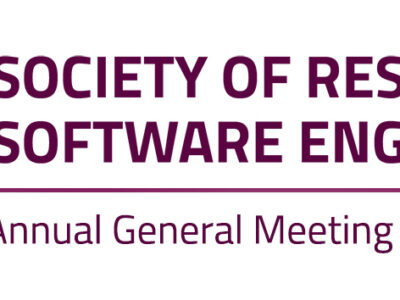Society of RSE AGM 2022
The 2022 Annual General Meeting of the Society of Research Software Engineering will be held at 17:00 – 18:00 on Wednesday 7th September 2022 in Auditorium G41, The Frederick Douglass Centre, Newcastle, UK as part of RSECon2022.
Purpose
The purpose of the AGM is for the trustees to update the Society’s members on what we have been doing this year to develop the Society and further our shared aims, and for members, to vote on specific resolutions and to have the opportunity to ask questions and raise topics for future consideration. No member resolutions have been put forward to be voted upon during the AGM but we will be holding a number of votes this year described on the agenda below.
All members will be eligible to vote at the AGM. A voting token will be sent to each eligible member shortly before the meeting. This token will allow us to verify the validity of your vote, without requiring you to be personally identified, and will ensure that only votes cast by eligible members are counted.
Agenda
- Elections and Resolution for the Appointment of Trustees (vote of resolution described below)
- Trustee Reports and Updates
- Interactive Q&A Sli.do questions session: https://app.sli.do/event/kZLccdx8U55DWU5Vqjqssi
- Please feel free to add questions in advance
- Announcement on results of resolutions
- Conclusion and end
Elections and Resolution for the Appointment of Trustees
The current trustees and their roles are listed on the Society’s website: https://society-rse.org/about/governance/
At the AGM, the longest serving third of the trustees will be standing down at the end of their elected terms, two additional trustees are standing down and temporarily appointed trustee must also stand down. There are therefore 7 trustee positions to fill.
Our trustee nominations process has identified 5 eligible trustees and as such there will not need to be a members’ vote on selection. Instead a confirmatory vote will be cast by members at the AGM to resolve that each of the following trustee candidates be elected to the board of trustees:
- Robin Nandi, Newcastle University
- Gillian Sinclair, University of Manchester
- Evelina Gabasova, The Alan Turing Institute
- Martin O’Reilly, The Alan Turing Institute
- Alex Coleman, University of Leeds
Information about each of these candidates is available below.
Papers and submitting questions or ideas
The trustees’ annual report and annual statement of accounts are now complete, covering the period from July 2021 – June 2022. Highlights will be presented in the trustees’ reports at the AGM.
- Formatted Version of the Trustee Report (https://society-rse.org/links/socrse-report-22)
- Annual Statement of Accounts (https://society-rse.org/links/socrse-accounts-22)
Attendees to the AGM can submit questions ahead of the AGM: https://app.sli.do/event/kZLccdx8U55DWU5Vqjqssi.
Questions will be addressed in the trustees’ reports and the subsequent Q&A session where possible, and at the end of the AGM we will explain how any topics that need more discussion can be taken forward.
Trustee candidate information
Robin Nandi
Research Software Engineer, Newcastle University
How have you contributed to furthering the RSE role and building the community?
I have recently joined Newcastle University as a Research Software Engineer. I have gone through carpentry instructor training to help educate researchers in software engineering. I have helped organise a Code Community at Newcastle to enable people to discuss issues and help each other.
What abilities can you bring to the role of trustee that would be useful in establishing and running the Society?
I bring experience with committees, minutes and financial reports from my time at Atom Bank. I also bring experience organising a community from Chess Club at Imperial College and Staff Badminton at Newcastle.
Which of the current activities that the Society engages in are you best suited to help with?
Infrastructure and Communications and Publicity.
What would you like to help achieve through the Society in the role of trustee?
I would like to build the RSE community across Universities and Industry by bringing clarity on the role and importance of the RSE to a wider audience. Also I would like to make the RSE membership more valuable to members through mentoring, forums and other resources.
Why do you want to be a trustee of the Society?
I want to be a trustee to enable me to provide leadership to help promote the aims of the society – promotion of good software practices and education of researchers – for which I am a natural advocate. Also I would like to gain experience navigating the governance structure of a charity and learn how to get things done in this context.
Gillian Sinclair
Research IT Relationship Manager, University of Manchester
How have you contributed to furthering the RSE role and building the community?
I currently have two roles (0.5FTE each) one of which is Research IT Relationship Manager at the University of Manchester. We have a large team of Research Software Engineers (one of the largest at a UK university) and I have worked closely with them to highlight the services that they offer to our research community. Together we have created and published a large number of case studies on the Research IT website demonstrating the wide range of skills and expertise within the RSE team in an engaging way, allowing researchers to understand the worth of having an RSE involved in their research.
I have also been responsible for the initiation of many community building events involving our RSEs such as our Research IT clubs where researchers would present their collaborative work with our RSEs to the wider research community.
At the start of the academic year I will be supporting the launch of a local RSE group at the University. The aim of the group is to connect RSEs from across the University and its research institutes bringing together a perhaps more diverse group of people including those who don’t necessarily see themselves as an RSE. This will be an excellent opportunity to highlight the work of the society and to encourage people to become members!
My second role is as Programme Manager for the N8 Centre of Excellence for Computationally Intensive Research (N8 CIR) which currently has a Research Software Engineer theme designed to bring together the RSE community across N8. I have worked with Marion Weinzierl to create and support the group’s activities as well as working with members of the N8 CIR governance groups to campaign for the recruitment of more RSEs at their institutions.
What abilities can you bring to the role of trustee that would be useful in establishing and running the Society?
With my N8 CIR role I am responsible for the budgeting for all our community building and training events that are held across the 8 universities – more than 15 per year. I am also responsible for budget reporting to our governance groups and the end of year finance administration which, between 8 universities, can prove somewhat challenging!
Both my current roles require a great deal of community building. Indeed all my roles over the last 20 years have involved community building across a large number of institutions as well as internally at Manchester. I have successfully built up the N8 CIR Digital Health and Digital Humanities themes bringing together theme leads from across the 8 institutions and starting to create research communities. We will be promoting our new Machine Learning theme in the next few months with a launch event bringing together researchers and RSEs from across N8 for the first time in some cases.
In my Research IT Relationship Manager role I create all the content for our Twitter account, website and monthly newsletter which now has over 1100 subscribers. I also create marketing campaigns for new services launched by Research IT as well as reminding people of the existing services that we offer. I am about to start the coordination of outreach and awareness raising of Research IT to the new PGR intake at the start of year which involves a large number of presentations and communication. Reminding people that you are there and what you can offer is a challenge as people are so busy so being able to demonstrate the benefits that you bring is key.
The Research IT website is currently a work in progress but is gradually expanding to become a showcase of what our team can offer our University researchers. I am working with several different groups on content for the website but my main current area of focus is working with our Research Support teams. We want to ensure that research IT services such as RSEs are properly costed in research grant proposals. Yet another issue that is common to many universities!
Throughout my 20 year career I have been the main organiser for many regional and national events and conferences as well as local organiser for international conferences of more than 1000 people. I was even the local organiser for the first Research Software Engineer conference back in 2016! It is something that I really enjoy even though it presents a set of unique challenges.
Within my N8 CIR role I am responsible for the development of the research themes and their activities. This involves liaising with our stakeholders regarding the needs of their communities and working with internal and external groups and organisations to make this happen. Currently I am planning the training and community building activities for the N8 CIR research themes for the next 12 months to ensure that we meet the requirements identified by the researchers in earlier requirement gathering sessions.
I have contributed to several research bids involving N8 CIR such as the recent successful EPSRC funded Digital Infrastructure Retreat (DRI) which was held in March. It was the first time that such an event had been held in the UK and we had the added challenge of making it hybrid! We received great feedback from all attendees, both in-person and virtual.
Over my 20 years of working with researchers in cross-institutional roles, I have set up and ran several research centres, nearly all of which involved Research Software Engineers. I am very used to being handed essentially a “blank sheet” so setting up and managing administrative processes from scratch is something that I am used to. Within N8 CIR I am also responsible for the coordination, meeting organisation and minute taking for all our governance groups.
Which of the current activities that the Society engages in are you best suited to help with?
As detailed above I have a wide range of relevant skills and interests but I feel the areas where I could contribute the most would be in a Secretarial role due to my years of experience participating in and organising governance meetings; conference organisation as this is something that I find challenging and enjoyable; and communications and publicity as this is an area that I am already active in through both my roles.
I am able to commit the required time to the role of trustee and I have the full backing of my manager, Robert Haines (Head of Research IT), for my application.
What would you like to help achieve through the Society in the role of trustee?
First and foremost I would like to see the Society grow. An increase in both numbers and diversity within the society would be something that I would like to work towards. A growth in membership from outside universities and for RSEs based at other research institutions to be aware of the society and the benefits that it brings would be wonderful.
I would also like to see an RSE career being more widely acknowledged and recognised. I have seen first-hand at a number of universities the difficulties in recruiting RSEs and the rising demand for the RSE skill set is obvious. We need to make it much more widely known that a career as an RSE is possible and an extremely rewarding one at that. If I can contribute to helping the society to grow its activities and outreach and to raise awareness of an RSE career path I would be very happy!
Why do you want to be a trustee of the Society?
As an ex-scientist I can only see the demand for RSE support in science (and other research areas) growing more and more in the years to come. Scientists should not have to be experts in software engineering as well as their area of science and I would hate to see scientific advancement and discovery held back by a lack of RSEs. It is important that we grow our pool of RSEs and I am delighted that Research IT are hosting three Year in Industry students in our RSE team this year – perhaps they will join us again at the end of their degree!
Evelina Gabasova
Principal Research Data Scientist, Principal Research Data Scientist
How have you contributed to furthering the RSE role and building the community?
I have contributed to furthering the RSE role both through my work in The Alan Turing Institute and externally through public engagement:
- Public speaking. I delivered multiple talks relating to my research software engineering work at large industry-focused developer conferences (QCon, NDC, GOTO and others), raising awareness of the profession outside of academia.
- Internally in the Alan Turing Institute. Apart from promoting and showcasing research software engineering to academic collaborators, I established research software engineering as a fundamental part of a large EPSRC-funded Prosperity Partnership with NATS (UK air traffic control provider), looking at automation in air traffic control.
- Internally within the Research Engineering group in the Alan Turing Institute. As a member of the leadership team of the Research Engineering group, I have contributed to multiple activities within the team that advance the role of research engineers at the intersection of AI, data science and software engineering. Examples include contributing to the formulation of a career ladder and promotion processes for Turing Research Engineers.
What abilities can you bring to the role of trustee that would be useful in establishing and running the Society?
My relevant experience comes from both my research engineering career and from outside of the academic environment:
In the Alan Turing Institute, I have been a member of the leadership team of the Research Engineering Group for the past 3 years. During this time, we collaboratively managed the group through organisational changes, pandemic and growth. I am passionate about open leadership and I am actively working on making our team a diverse and open group where every voice is heard.
As a particular example of my work in this area, I was responsible for formulating our team’s hybrid working policy, organising events to keep our distributed team connected, monitoring well-being in the team and publishing an internal newsletter. These activities also translate well into cultivating a wider community.
Apart from my work in the Turing, I also have previous experience of being a trustee of a non-profit in the area of open source development: I served as a trustee of The F# Software Foundation, a US-based non-profit dedicated to furthering and promoting the open source F# programming language. I was elected by the members of the Foundation twice, in years 2015 and 2016. Our work there included organising a mentorship scheme, supporting and promoting local user groups and fundraising.
Which of the current activities that the Society engages in are you best suited to help with?
Overall, I would be happy to engage in any of the activities required to run the Society. Given my background and experience, I would be especially happy to help with communication and outreach, membership and web content.
What would you like to help achieve through the Society in the role of trustee?
I would like to build bridges with research software engineers outside of academia. The research software engineering profession has been spreading not only in academic context, but also in the industry. Companies that are active in research employ a large number of research engineers or software engineers involved in research. I belive the RSE Society should be more active in connecting with industry, growing the community, learning from each other and promoting sustainable research together.
In addition to that, as a trustee I would like to promote the role of open source development. Academic research often considers code as one of its publications, being deposited on GitHub without much further involvement. I would like to organise RSE activities around contributing to existing larger open source tools that we use, such as RSE Hacktoberfest activities or coordinated Google Summer of Code RSE involvement.
Why do you want to be a trustee of the Society?
The research software engineering role has given many of us a dream profession – combining technical expertise with research applications. I would like to give back to the community and become a more active member of the society.
Martin O’Reilly
Director of Research Engineering, The Alan Turing Institute
How have you contributed to furthering the RSE role and building the community?
Over the past 5 years I’ve helped define, grow and evolve the research engineering group at the Alan Turing Institute from a newly established team in 2016 to one of the larger teams in the community today, initially informally as one of the founding team members and then more formally in various roles as part of the group’s collaborative leadership team. I think we’re among those pushing the boundaries within the community in areas such as career progression pathways, flexible working and collaborative governance and I’d like to support the Society in advancing the community norms in these areas.
Since first taking on a more formal leadership role at the Turing a few years ago, I’ve been part of the RSE Leaders network, collaborating on community wide efforts to share and develop good practices, support the establishment of new teams and develop and align better on things like career pathways.
I’ve helped support more formal collaboration and knowledge exchange across RSE groups through the Turing’s delivery partner model, where RSEs at other groups work alongside Turing research engineering colleagues on Turing projects.
I’ve provided formal and informal mentoring to members of the RSE community, most recently through the Society’s recently established mentoring scheme.
What abilities can you bring to the role of trustee that would be useful in establishing and running the Society?
I’ve experience of leading and supporting teams from establishment to sustainability both at the Turing and in a previous role establishing a team of developers and analysts at City & Guilds. I’ve also supported other organisations in evolving their working practices as a consultant. The Turing’s research engineering group has grown from 3 to more than 30 over the past 5 years, and has gone through several iterations of its operating model, roles and processes during that time as the Institute has transitioned from a start-up to an established research organisation. Throughout that time I’ve been heavily involved in shaping not just the evolution of the team and its practices, but also the way we do that evolution – through open, collaborative consultation across the whole team. Many of the practices that were first established in the research engineering group have since been adopted across the wider Turing, and I’m keen to help raise the bar in how RSEs are supported by their organisations across the RSE profession.
My professional management experience also includes budgeting and financial reporting for the teams I’ve led, and I have experience with making business cases / grant applications and with contracting. I also have some (more limited) experience of the formal administrative, legal and financial aspects of running a legal entity through running a scout group and being a director of the (very small) company that manages my building, where I’ve carried out similar duties as those of the Society’s secretary and treasurer roles.
Which of the current activities that the Society engages in are you best suited to help with?
I’m especially interested in supporting the Society’s work to improve the security and sustainability of RSE positions across the community. I’m also interested in supporting the establishment of new groups and the scaling and evolution of existing groups. I think my prior experience at the Turing and elsewhere is particularly suited to helping in these areas and I think the Society can support this activity in a range of ways, from sharing how different groups do this to establishing informal and formal norms for the community.
In terms of particular Trustee roles, I think much of my experience would be relevant for the vice-president or vice-treasurer roles, and I enjoy doing the things these roles require. However, there are many different ways for people to be great at these roles and I’m equally happy to support others in these roles and take on another role myself. I’ve experience of managing infrastructure through some time supporting the Turing community’s use of cloud computing, my work on the Turing’s cloud-based Safe Haven, and introducing DevOps practices at a previous client, so the infrastructure second role could also be a good fit for me. However, running the Society is a team effort and, if elected, I’m happy to take any role to best meet the team’s overall needs.
What would you like to help achieve through the Society in the role of trustee?
One of the things I’m proudest of is the development of our career progression pathway at the Turing, which now ranges from a Junior training role through to a Principal role as part of the group’s formal leadership team, and I’d love to help establish a “whole career” progression pathway across the community as a whole. I’d also like to help the Society to continue to support the establishment, growth and development of more RSE groups to support more and more people in making research software engineering their career.
I’d also like to help improve how we share our knowledge and experience across the community. In addition to events like the conference, talks and workshops, I’d like to support ways for RSEs to learn from each other by working with colleagues from different organisations. We’ve done some work on this at the Turing and I know there are other initiatives within some of the regional networks. It would be great to connect and expand this sort of collaboration as part of the community’s overall knowledge exchange activity.
Why do you want to be a trustee of the Society?
I feel very lucky both to have found the job I always wanted but never knew existed, and to have had the opportunity to help establish a great place for people to come together and do that job as a sustainable and fulfilling career at the Turing. I want to help make it possible for more people to have a career doing this job and to make that career a supportive and enriching experience for them. I think the Society has a critical role to play in supporting the continued evolution and development of the profession and I’d like to play my part in supporting that. I’ve also seen the power of open, collaborative leadership at the Turing and I feel that the Society operates itself in a similar manner and I would find it an enriching and enjoyable experience to be a Society Trustee.
Alex Coleman
Research Software Engineer, University of Leeds
How have you contributed to furthering the RSE role and building the community?
I’ve been an RSE at the University of Leeds since 2019. Within this role I work with the Research Computing team of RSEs to deliver regular training to researchers across the University to increase software skills across campus (particular with a focus around HPC). I also advocate internally for research software engineering within our IT department and to researchers. I also organised an in person conference to showcase all the amazing research computing related activity at Leeds, ResCompLeedsCon2022. This was a fantastic event that brought together our diverse community of researchers doing computational work to help build collaboration and awareness of research software.
What abilities can you bring to the role of trustee that would be useful in establishing and running the Society?
Please provide examples of skills and experiences you have that would be useful in your role as trustee
I am keen to bring my skills to this trustee role, in particular:
- I am responsible for managing a number of mailing lists, and developing communication campaigns around our technology showcase talk series TechTalks as well as the ResCompLeedsCon2022 conference. This involves not only writing copy for email/web content but also developing high quality graphics for social media
- I am also familiar developing websites both through WordPress tools but also using GitHub Pages and Jekyll. Our team webpage is hosted as a Jekyll site – https://arc.leeds.ac.uk/ and our HPC documentation is available as a GitHub action-deployed Jupyter Book – https://arcdocs.leeds.ac.uk/welcome.html
- I have experience organising events, predominantly locally at the University of Leeds both in person and online, bringing together researchers for informal drop-in sessions to discuss research computing related issues, but also hosting seminar-like TechTalks on a range of topics of interest to researchers and large scale conference events (>100 in person attendees) such as ResCompLeedsCon2022
- Building the computational research community is a big part of the work I am involved in with the Research Computing team at Leeds and so would look to bring my experiences of this ongoing work to this trustee role
Which of the current activities that the Society engages in are you best suited to help with?
I feel I would be best suited to help with the following roles:
- Communications and publicity
- Membership and outreach
- Web content
- Infrastructure
- Secretary
What would you like to help achieve through the Society in the role of trustee?
I would like to build on the work of previous trustee boards helping to continue to expand the RSE Society membership, contribute to developing additional resources for those running RSE groups and advocating nationally and internationally for the importance of research software engineering.
Why do you want to be a trustee of the Society?
I think the research software engineering movement is crucial to helping support and accelerate scientific innovation. Without institutions such as the RSE Society I would have found it harder when I started out to really understand what my role was, I want to use my experiences as an RSE to give back to the society and help keep growing our community and ensuring SocRSE remains a strong advocate for the RSE movement.

